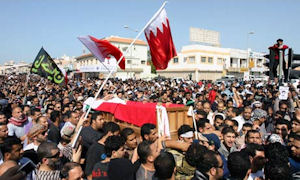Protests against the authoritarian regimes in the Arab world have now swapped to Libya, where demonstrators called for the resignation of the country’s prime minister. Hundreds of protesters took to the streets of Benghazi, the country's second largest city, on Wednesday and demanded that the government be ousted. There were no calls for longtime leader Muammar Gadhafi to step down. On Monday, however, several opposition groups in exile called for the overthrow of Gadhafi and for a peaceful transition of power in Libya.
As in Egypt and Tunisia, Libyans were using social networking websites like Facebook in calling for a nation-wide day of protests on Thursday. The country’s official news agency made no mention of the protests, saying only that supporters of Gadhafi were demonstrating in the capital Tripoli, in Benghazi and in other cities. However, the online edition of Libya's privately-owned ‘Quryna’ newspaper, which is based in Benghazi, reported that a crowd of people angry at the arrest of a human rights campaigner had gathered armed with petrol bombs and stones. Fourteen people were reportedly wounded, including ten police officers, but none of the injuries were serious, the website reported. A Benghazi resident contacted by the ‘Reuters’ news agency said the people involved in the clashes were relatives of inmates in Tripoli's Abu Salim jail, where militant Islamists and government opponents have traditionally been held.
Libyan state television showed footage of a rally in the Libyan capital, Tripoli, of government supporters. Participants chanted slogans accusing Qatar-based television news channel ‘al-Jazeera’ of broadcasting lies. Demonstrations also erupted this week in Bahrain, Yemen and Iran, inspired by the unrest that led to the ouster of the presidents of both Egypt and Tunisia.
 Meanwhile, in the tiny Persian Gulf emirate of Bahrain, anti-government protests continued for a third day on Wednesday, despite a rare apology by the king for the deaths of two demonstrators in police firing. The protesters, seeking political reforms and better human rights in the kingdom, were refusing to disperse from the square in the capital Manama. The monarch, Sheikh Hamad bin Isa Al-Khalifa, pledged "to investigate the killings", local media reports said. "We will ask legislators to look into this issue and suggest needed laws to resolve it," he said, adding that peaceful protests were legal.
Meanwhile, in the tiny Persian Gulf emirate of Bahrain, anti-government protests continued for a third day on Wednesday, despite a rare apology by the king for the deaths of two demonstrators in police firing. The protesters, seeking political reforms and better human rights in the kingdom, were refusing to disperse from the square in the capital Manama. The monarch, Sheikh Hamad bin Isa Al-Khalifa, pledged "to investigate the killings", local media reports said. "We will ask legislators to look into this issue and suggest needed laws to resolve it," he said, adding that peaceful protests were legal.







